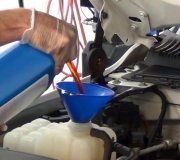Welcome to my world. I have a 1993 Dodge Dynasty with 4,950 miles. Here is the way I look at it. Antifreeze is ethylene glycol, which is alcohol, and it will always be alcohol. It is the additives in it that wear out and that is due to time, (amount of time it is hot). While the engine is running, combustion gases are constantly seeping very slowly into the cooling system where it forms an acid that attacks metal parts. One of the additives in antifreeze is corrosion inhibitors which neutralize that acid.
If you think about this logically, you could replace your coolant with antifreeze that you had sitting in your garage for five years, and those additives would still be fine. Is there much difference between sitting on a shelf in your garage or sitting in a cold engine?
That is one side of the story. The other side is all antifreeze manufacturers specify replacement based on time, not mileage. They are still happy if you replace it every two years, even if that means 100,000 miles.
Instead of losing sleep over that confusion, there is a more urgent issue with your car. GM started using the red "Dex-Cool" antifreeze as far back as the 1990's, and that has caused a real lot of problems for GM owners. To make their cost or regular maintenance appear to be lower than that of their competitors, they advertised this as "lifetime" antifreeze, and as a result, a lot of people never changed it, and ended up with leaking heater cores and radiators due to corrosion. They hid a tiny sticker under the hood that said to replace the coolant every three years, which was drastically different than what they had advertised. Even the Dex-Cool company never specified anything other than two year replacement intervals. A lot of mechanics call this "Dex-Mud" because it turns into a thick glop if it becomes contaminated with non-compatible antifreeze. You have the low mileage in your favor, but there is no way I would ever consider telling a customer it is okay to go five years, regardless what the car manufacturer says.
There is a couple of tests you can do to determine the condition of your coolant. The first is to use a digital voltmeter to measure the results of its acidity. Any two different metals and an acid is a battery. "Cell" is the proper term, but that is not important to my wondrous story. Your coolant comes in contact with lead and tin in solder, iron and aluminum in the engine, and potentially brass in the radiator and heater core, at least on older cars. The acid that forms in the coolant completes the battery, and that develops a voltage.
Set your voltmeter to the 2.0-volt or 20-volt scale. Touch one probe to the battery's negative post. Stick the other probe into the coolant, but do not let it touch anything metal. This is normally done in the radiator, but GM could not be bothered to put a radiator cap on their radiators. You will have to stick the probe into the reservoir. I am not sure if that will work as well, but try it. If you find a reading of 2.0 volts or more, there is too much acid in the coolant, indicating the corrosion inhibitors are worn out. That means the same is likely true for the water pump lubricant and the other additives.
You can also buy test strips at any auto parts store. Those will work just fine in the reservoir. They will change color to show how acidic the coolant is.
Saturday, June 10th, 2017 AT 7:37 PM




